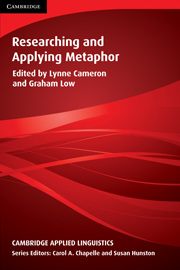Book contents
- Frontmatter
- Contents
- List of contributors
- Acknowledgements
- Conventions
- Series editors' preface
- Preface
- I KEY ISSUES IN METAPHOR RESEARCH
- 1 Operationalising ‘metaphor’ for applied linguistic research
- 2 Researching metaphor
- 3 Validating metaphor research projects
- II FROM THEORY TO DATA
- III ANALYSING METAPHOR IN NATURALLY OCCURRING DATA
- IV ANALYSING METAPHOR IN ELICITED DATA
- References
- Index
2 - Researching metaphor
Published online by Cambridge University Press: 05 October 2012
- Frontmatter
- Contents
- List of contributors
- Acknowledgements
- Conventions
- Series editors' preface
- Preface
- I KEY ISSUES IN METAPHOR RESEARCH
- 1 Operationalising ‘metaphor’ for applied linguistic research
- 2 Researching metaphor
- 3 Validating metaphor research projects
- II FROM THEORY TO DATA
- III ANALYSING METAPHOR IN NATURALLY OCCURRING DATA
- IV ANALYSING METAPHOR IN ELICITED DATA
- References
- Index
Summary
Introduction
Studying metaphor sometimes seems like an overwhelming experience. Contemporary scholars wishing to understand something about how metaphor is created, understood and applied often find their heads spinning as they try to get a handle on the voluminous literature on the topic. If you sit down and try to search any of the many databases on recent research publications for articles with metaphor in the title, you will quickly see that there are literally thousands of such papers. Even as far back as 1979, literary critic Wayne Booth commented, somewhat tongue in cheek, that the growing interest in metaphor was so great that by the year 2039, “there will be more students of metaphor than people” (Booth, 1979: 47). As we approach the millennium, I am beginning to believe that Booth's prophecy might turn out to be literally true!
In my own experience in the contemporary world of metaphor research in cognitive science, I often encounter scholars, including those who study metaphor and those fearful to do so, voicing concern that there are actually too many different theories of metaphor. For example, in the field of cognitive psychology alone, there are a number of contenders for the best metaphor-theory contest, among them being salience-imbalance theory (Ortony, 1979c; Ortony et al., 1985); domains-interaction theory (Tourangeau & Sternberg, 1981, 1982); structure-mapping theory (Gentner, 1989; Gentner & Clements, 1988); class-inclusion theory (Glucksberg & Keysar, 1990); and conceptual metaphor theory (Lakoff, 1987a; Lakoff Johnson, 1980; Gibbs, 1994).
- Type
- Chapter
- Information
- Researching and Applying Metaphor , pp. 29 - 47Publisher: Cambridge University PressPrint publication year: 1999
- 5
- Cited by



